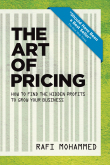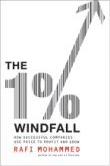How a Pricing Expert Negotiates Cheap Tickets
Reprinted from the Harvard Business Review website.
I love going to concerts and sporting events. But I hate paying full price for tickets. Instead, I wait until the day of the event and try to buy tickets from scalpers at a big discount.
Over the last few months, I sat in the front row to see the Eagles, the second row at a Santana concert, and the third row when Aerosmith and the J. Geils band played Fenway Park. In each case, I paid 20 to 60 percent below the face value of the ticket.
For someone like me, who studies and consults with companies on how to price products to optimize profits, the ticket market offers a fascinating real-time study of pricing power and the discounts available to savvy negotiators.
Scalpers are commonly viewed as having market power because they have the best seats and dictate wildly high prices. Yes, if you want to buy tickets well in advance from a scalper, prices will be high. Why? There's little incentive for ticket resellers to lower their price when there is plenty of time to try to hook a "whale" willing to pay a large premium.
But the law of supply and demand applies to tickets, and by the day of the event, there are often more ticket sellers than buyers. That's true even for sold-out shows: people's plans change, and lots of ticket holders often have to skip an event. That excess supply, coupled with the reality that tickets will be worthless in a few hours, leads to lower prices. That's when I look to buy — and when I do, I try to dictate the price.
As a buyer, I know my ability to negotiate will vary based on who's selling. Just as milk prices vary by distribution outlet — a gallon costs more at a convenience store than, say, Costco — so do ticket prices. Tickets purchased from local ticket agencies — the kind that advertise and operate out of retail offices — are priced higher than similar tickets sold by individuals in front of the venue. There's value in the convenience of purchasing from a reputable entity, so the established businesses charge a premium.
These well-known resellers are generally less willing to negotiate on price as an event approaches. If it becomes known that a premium-branded outlet heavily discounts just before an event, customers will wait to purchase. As a result, it's better for them to "eat" remaining tickets than compromise future margins. Conversely, resellers on the street will take virtually any price at the last minute.
Prices also vary based on whether the seller offers guarantees that the tickets aren't counterfeit. Some resellers offer more protection than others. Ace Ticket in Boston, for instance, offers a 200% refund if their tickets are found to be counterfeit. Tickets purchased from individuals fall more into the caveat emptor category. I've never had a problem, though, so I rarely worry about counterfeit tickets, and I avoid paying a premium for such guarantees.
As with many negotiated purchases, the first price a ticket scalper quotes you isn't the final price. Go into your "you need to do better for me" posturing. Classic tactics include invoking a higher authority ("my budget is tight") or competition ("other resellers are offering lower prices"). Trust me: you'll be rewarded with a lower price.
At the same time, it's important to be courteous during negotiations. It's tempting to remind resellers that the value of their tickets is rapidly deteriorating, but refrain from doing so. They know the market and as in any negotiation, you don't want antagonism to prevent you from getting the best price. (Although rarely enforced, some states do have laws preventing resale of tickets above face value. To be clear, our goal is to purchase tickets significantly below face value, which is always legal.)
It can also pay to think creatively. A few minutes before a recent U2 concert, a ticket reseller and I were locked in a tough negotiation. I would not budge on my offer of $50 under face value for his 12th row seats. The reseller offered a creative resolution to break the stalemate: flip a coin. Heads I'd get my price, tails I'd pay his. I won. It was sensational to have Bono singing less than 25 feet away from me — but it was equally thrilling to learn that I had paid $500 less per ticket than others in the same row.
The ticket scalping market is often viewed as nefarious, but in reality it's like every other market for products and services. Understanding the market and applying basic negotiation skills will result in you sitting in the best seats in the house at a discount. Negotiating for tickets on the day of a show can be a hassle, but as in every other purchasing decision, it's just a question of what you value. For me, it's usually worth the wait.




